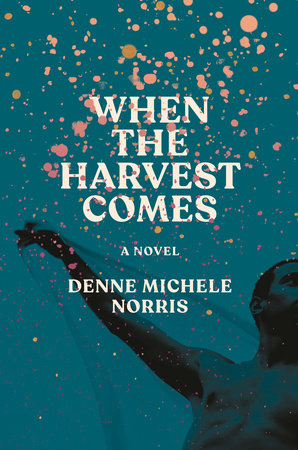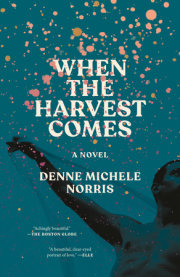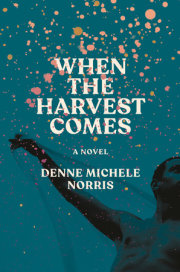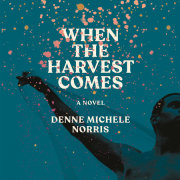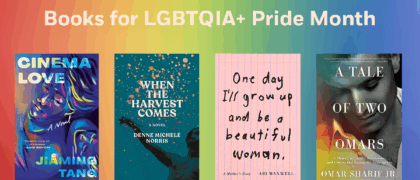One Davis Josiah Freeman is perfectly safe.
He lies flat on his back, legs spread, ankles in the air, sweating from the heat of Everett’s body on top of his. He revels in Everett’s power—the strength of his arms, the hardness of his chest, and the tuft of dark hair that fans out from his navel. Davis loves the softness of that hair against the hardness of Everett’s body, like a window through which he could almost touch Everett’s soul.
Davis aches when Everett pushes deeper; he whimpers, then opens. He would be willingly consumed by Everett, swallowed whole, if it were possible. He places one hand on Everett’s chest, the other gently on his neck, and pulls him down. Eyes meeting eyes, lips parting for lips. When Everett is inside him, Davis becomes another thing, a being both powerful and delicate, animal yet celestial. Everett is uncomplicated in his manliness: the depth of his voice, his penchant for bourbon and stout, the sheer size of him—both height and broadness. He becomes beastly during sex, and with any other man, it would scare Davis. But with Everett, he need not be fearful. Davis looks up at the way Everett’s eyes have gone slack, almost milky white—his pupils having rolled to the back of his head.
In some ways Davis envies Everett this existence: moving through the world with the easy confidence of a man who is always in charge, always sure of himself. He is passionate and unafraid of a fight. Davis knows that with Everett by his side, he gets to live a particular kind of freedom. He can be silly. He can be naïve. He can have a tank full of sugar, as he’d once heard the Reverend say.
Davis can do this because he is loved and desired, which means he is protected.
His breath catches when Everett takes his wrists, pulls them up over his head, and brings them together, binding him to the bed. Everett lowers his chest until their torsos meet. He buries his lips in Davis’s neck, breathing in the perfume with which Davis carefully dabbed himself that evening. He nibbles, Davis moans, and Everett thrusts deeper, rougher, his body now slapping hard against Davis, who shudders, then whimpers again, his voice turning up on the final syllable as though the name—Everett—is a discovery, both question and answer. He arches his back, opening himself more fully. Everett peers into his eyes, then spits into his mouth. Davis feels his flesh come alive; the tips of his fingers burn—trees turned to ash. Everett is anywhere, everywhere, his presence heard and felt with the matter-of-factness of air, trees, and water.
He fills Davis, and he fills the room.
With every movement more frenzied than the last, he drives Davis to bite his bottom lip, to clench the sheets. Davis convulses, and when he comes, fingernails digging into Everett’s back, he considers this: He could not escape this man if he needed to. He is not strong enough to fight Everett off, not quick enough to move from underneath him. He loves the vulnerability of this, the theoretical danger in their union. He thinks, all the time, of that vulnerability—in a way it turns him on. It’s an illusion, of course. Everett would never harm him. But he loves it nonetheless, and he knows Everett loves it, too.
In twenty-four hours, they will be married.
Davis wants to stay right where he is; he wants to remain under Everett, held by Everett for as long as possible. He wants to revolve around this beastly man like he is the sun. After Everett comes—groaning, panting, the hair on his body slick with sweat—he lowers himself down to the bed, arms encircling Davis, lips breathing warm air along Davis’s neck, where he rests.
“Stay inside me,” Davis whispers. His voice is shaky, his body still trembling. He closes his eyes and turns to his side. Everett nods and continues kissing his neck and shoulder. He loves the way Davis fits so easily in his arms—body short and slight, golden skin soft and clean, and so damn pretty. He runs a hand up and down Davis’s leg.
“You were tossing and turning in your sleep.” Everett looks down at Davis. He knows not to ask too explicitly. Davis has a lot of pride. He lets Everett in when he’s ready, and not a moment sooner.
“I’m sorry. Did I wake you?” Davis runs his fingertips along Everett’s arm, his breath silent. Everett kisses him again, then shakes his head.
“I’m used to it.” He pauses, listening as waves lap the shore. “But you kept saying something I’ve never heard you say. ‘Sunny Boy. Sunny Boy.’ ”
Davis brings Everett’s hand to his mouth. “He called me that.” He kisses the pads of Everett’s fingers.
“Who?” Everett holds Davis tighter.
“He used to say I slipped out easy like I was covered in Crisco on the sunniest day of the year.”
“Your father,” Everett says.
“The Reverend.” Davis rolls his eyes. “It was a lie, you know.”
Everett feels a chill move between them.
Davis gazes through the open window, the curtain blowing in the paltry autumn breeze. “I hated him calling me that. My mom almost died because of me.”
“It wasn’t because of you,” Everett says.
Davis shrugs, then turns over, facing Everett. “I should call you Sunny Boy.” He sits up, planting both hands on Everett’s cheeks. “You’re like a planet. My gravitational pull. I couldn’t get away if I tried.” He lays down again, resettling into Everett’s arms.
“Do you wish he was coming to the wedding?” Everett holds Davis tighter, their bodies fully flush against each other.
What Davis wishes for is the ability to make himself even smaller, daintier. “If I’d wanted him to come to the wedding, I would’ve invited him.”
Everett brushes his nose along Davis’s neck, his voice a whisper. “It seems like you were dreaming about him, Davis.”
“Well, I don’t remember it. You’re the one who brought it up.”
Davis looks out through the window upon the Montauk beach as earthbound snowflakes, glittering pink and white, slowly make their way. They won’t last; most won’t even reach the ground, merely dancing in the sparkling moonlit sky. Davis wraps Everett’s hand in both of his, holding it tight to his body. He tries to match his breathing to the rise and fall of Everett’s chest.
Copyright © 2025 by Denne Michele Norris. All rights reserved. No part of this excerpt may be reproduced or reprinted without permission in writing from the publisher.

